Beautiful older restoration, runs and drives superbly, new radials, gorgeous!!
- Price:
- Location: Macedonia, Ohio, United States
- Make: Cadillac
- Model: Other
- SubModel: Convertible
- Type: Convertible
- Year: 1940
- Mileage: 69,110
- VIN: 8324440
- Color: Brown
- Number of cylinders: 8
- Fuel: Gasoline
- Transmission: Manual
- Interior color: Brown
- Vehicle Title: Clear
1940 Cadillac Other Convertible Description
If you’ve been in this hobby long enough, you’ll remember that the standard for collector cars wasn’t always 100-point perfection. The cars were used as intended, driven frequently, and restored to make them reliable, not just beautiful. We’ve lost that in our pursuit of perfection, trophies, and “safe investments,” but I would argue that if you’re truly interested in the old car hobby, what you want is an older restoration that was done during that great time when people cared as much about driving excellence as cosmetic brilliance. These are machines, built to be driven, and doing anything other than that seems to be doing them a disservice, don’t you think?
With all that in mind, this 1940 Cadillac Series 62 convertible coupe is just a fantastic car. It was probably restored in the early 1980s, and we have a lot of restoration receipts dating from that time. But don’t assume that because the restoration is approaching 40 years old that it’s worn out, because this handsome Cadillac looks, runs, and drives like a million bucks. The color is called Beaver Brown, and it appears to be the car’s original choice. It’s not a terribly exciting name, but in 1940, GM was starting to experiment with metallic paints, and the glowing coppery finish on this car is quite correct and in the sunlight, it simply glows. We’ve had more than one visitor to our showroom stop and remark about what a beautiful color it is, so please come see it before you make up your mind that Beaver Brown isn’t for you. Obviously, it’s not original paint (although we believe the dashboard is still factory lacquer) but it has a soft shine that’s entirely appropriate and the bodywork underneath is in excellent condition with no evidence that this was ever a rusty car. 1940 Cadillacs were an evolution of the 1939 design, with separate headlights, a big V-shaped grille, and “catwalk” grilles on either side, and the effect is rather imposing. In fact, this is a very imposing car from any angle, but as a convertible coupe, you don’t immediately notice just how big it really is. This is full-sized Cadillac luxury at its best.
Much of the chrome has been restored and it’s in fantastic condition. The bumpers, hood ornament, and parking lights are excellent, the sleek grilles on either side of the hood aren’t pitted, and the stainless window surrounds shine up beautifully. This car carries an accessory grille guard up front that looks great and the taillight lenses are still glass, not plastic, so they’ll look good practically forever. Important stuff like the rubber fender welting, weather seals, and other soft part have been replaced, so it seals up well and doesn’t have any squeaks or rattles as it goes down the road. As I said, this car works like you’d expect the world’s finest to work.
The interior is obviously a product of the time, but it’s got a period look that works well and that textured brown vinyl upholstery wears like iron, so it’s great if you actually use your car or have kids riding with you. The vertical pleats are similar to how the factory might have done it and the details are quite nicely done, with piping and flat panels where they belong. The carpets are probably one area that could stand to be updated, as they’re a little more yellow and a little more plush than you might have seen in 1940, but correct tan carpets are very inexpensive and it would make a huge difference inside. The dashboard is original, and shows some cracking and checking in the paint, but I think that adds to the car’s history and it would be a shame to erase it. The big steering wheel is in excellent shape with only one or two cracks and the shifter for the 3-speed manual transmission moves through the gears more easily and precisely than any other “three-on-the-tree” setup I’ve ever used. All the gauges are fully functional with bright, crisp markings, and for some reason, Cadillac warned you about going more than 50 MPH with a red stripe on the speedometer (don’t worry, this car cruises comfortably at 60-65 MPH). The controls are simple, with an electric fuel pump switch stashed under the dash along with knobs for the power convertible top, heater, and cowl vent. Turn signals were new and in 1940 they weren’t self-cancelling yet, but there is a flashing light to remind you they’re on. The original AM radio is still in place but not surprisingly, it’s inoperable, and the same goes for the clock over there in the glove box lid. The back seat is good enough for two real-sized adults and the trunk seems to be entirely original, save for the brand new spare tire. The tan convertible top shows some age but it folds quickly and easily into the well with the touch of the switch and a matching canvas boot gives the car a very sleek top-down appearance.
Cadillac’s 346 cubic inch flathead V8 is a wonderful machine for your full-sized luxury convertible. Sure the V12s and V16s would get all the glory, but this is the engine that powered them through the ‘40s and put tanks on the battlefield in WWII. Smooth, torquey, and incredibly reliable, you’ll never think twice about hitting the starter and driving this car any distance, which is perhaps the greatest luxury of all in the old car world: confidence. It was rebuilt when the car was restored years ago, but I would be surprised if there are more than 25,000 miles on it; it makes plenty of oil pressure, doesn’t smoke, starts quickly, and idles smoothly even when it’s cold. In fact, it runs so smoothly and silently that on two separate occasions with two different passengers in the car, they warned me that they thought the engine had stalled while waiting for a red light. It is incredibly smooth and quiet. The light green engine enamel isn’t quite correct, but the hardware used throughout is how Cadillac did it in 1940 with the only notable deviations being the electric fuel pump underneath and a regulator at the mechanical pump. It stays cool, doesn’t get fussy on warm days, and simply works the way you want your old car to work. And this kind of bulletproof reliability only comes from use, and I can assure you that all the bugs have been worked out here.
I mentioned the smooth-shifting 3-speed manual transmission already, and it has the right ratios to make the big V8 feel peppy around town, and with 3.90 gears out back, it’s happy to cruise at modern highway speeds without effort. It climbs hills without a downshift, it punches through traffic without being a rolling road block, and perhaps all that is why Cadillacs remain such popular tour cars in the CCCA. They simply do everything well. The suspension has been recently rebuilt, so it feels tight and accurate on the road, the brakes are firm and confidence-inspiring, and a recent exhaust system reduces the V8 to a muscular whisper at idle and near silence at speed. It is not detailed for show underneath, of course, but it’s quite clean and tidy with no rust, perforation, or other long-term issues. The original 16-inch wheels were painted to match the bodywork and are fitted with brand new Diamondback Classic wide whitewall radials that ride and handle far better than any bias-ply tire ever could.
Can you tell that we’re in love with this car? It’s impressive, it’s attractive, and the way it drives will absolutely win you over. If you’re looking for trophies and don’t need a car to do anything but climb on and off a trailer, this isn’t the car for you. But if you want a Full Classic convertible that can drive cross-country with nothing more than gas in the tank, a car that’s welcome at virtually every event, and one that will make the driver smile more than the people looking at it, we’ve seldom seen one finer. Call today!
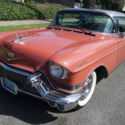 1957 COUPE DE VILLE - SIMPLY BEAUTIFUL & GREAT DRIVING OLDER RESTORATION!
1957 COUPE DE VILLE - SIMPLY BEAUTIFUL & GREAT DRIVING OLDER RESTORATION!
Mileage: 99,200
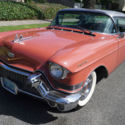 1957 COUPE DE VILLE - SIMPLY BEAUTIFUL & GREAT DRIVING OLDER RESTORATION!
1957 COUPE DE VILLE - SIMPLY BEAUTIFUL & GREAT DRIVING OLDER RESTORATION!
Mileage: 99,200
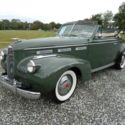 1940 Lasalle Series 50 Convertible Older Restoration Runs Excellent
1940 Lasalle Series 50 Convertible Older Restoration Runs Excellent
Mileage: 30,887
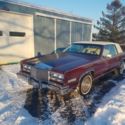 1985 Cadillac Eldorado 64k miles survivor car runs and drives beautiful
1985 Cadillac Eldorado 64k miles survivor car runs and drives beautiful
Mileage: 64,289
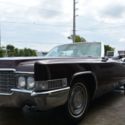 1969 CADILLAC COUPE DEVILLE CONVERTIBLE RUNS AND DRIVES LOOKS BEAUTIFUL LOW RES.
1969 CADILLAC COUPE DEVILLE CONVERTIBLE RUNS AND DRIVES LOOKS BEAUTIFUL LOW RES.
Mileage: 93000
 1972 cadillac Eldorado convertible - Runs and drives beautiful - 64,154 MILES
1972 cadillac Eldorado convertible - Runs and drives beautiful - 64,154 MILES
Mileage: 64,156
 Best Buy-Runs & Drives Well-Solid & Original-No Reserve-Easy Restoration-
Best Buy-Runs & Drives Well-Solid & Original-No Reserve-Easy Restoration-
Mileage: 90005
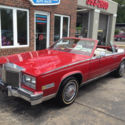 1984 Cadillac Eldorado - Runs and drives, top works, needs restoration!
1984 Cadillac Eldorado - Runs and drives, top works, needs restoration!
Mileage: 93,760
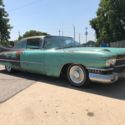 1959 CADILLAC COUPE DEVILLE RUNS AND DRIVES PATINA, SLED , RESTORATION !!!!
1959 CADILLAC COUPE DEVILLE RUNS AND DRIVES PATINA, SLED , RESTORATION !!!!
Mileage: 23,000

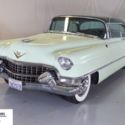 1955 Cadillac 2-Door Coupe Survivor, Gorgeous Vehicle runs and drives perfect
1955 Cadillac 2-Door Coupe Survivor, Gorgeous Vehicle runs and drives perfect